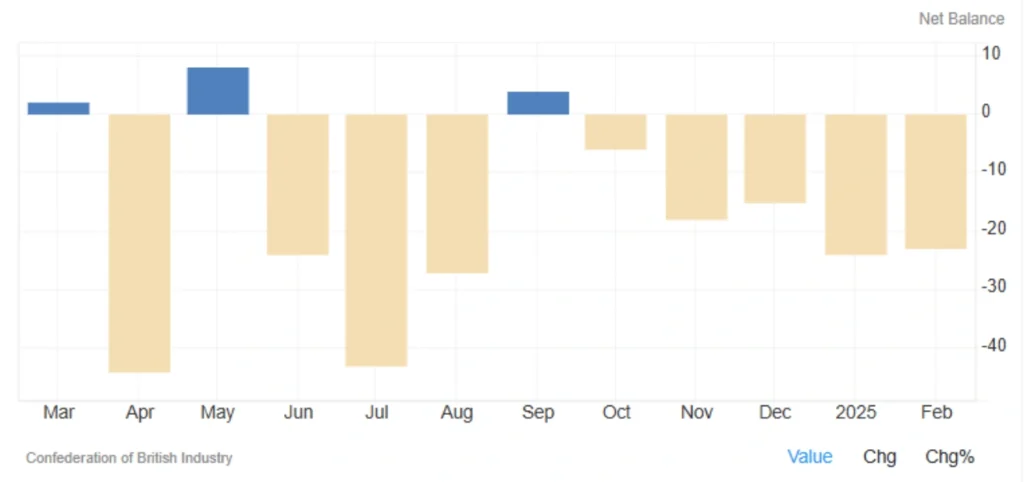
UK Retail Sales Show Modest Improvement in February 2025
In February 2025, the UK Retail Sales Volume Index showed a slight recovery, reaching -23 compared to -24 in January. This figure surpassed market expectations of -25, suggesting a minor rebound. However, this modest improvement wasn’t enough to overcome the ongoing challenges in the retail sector. According to the latest CBI report, weak demand and the impact of increased social security contributions from the Labour government’s autumn budget continue to weigh on economic sentiment within the industry.
Why Is Consumer Demand Still Weak?
Wage Growth vs. Consumer Spending
Despite wages growing faster than inflation, consumer demand remains subdued. This cautious spending reflects ongoing concerns about the economic outlook and future inflation, influencing consumer confidence and behavior.
Seasonal Influences and March Outlook
Retailers anticipate lower-than-usual sales in March, partly due to Easter falling later this year. Additionally, many British retailers plan to reduce investments at the fastest rate in over five years, influenced by declining consumer spending and rising operational costs.
Key Factors Behind the Numbers
Even with rising wages, consumers are hesitant to increase spending. This cautiousness reflects broader worries about economic stability and future inflation, potentially hindering overall economic recovery.
Impact of the Labour Government’s Autumn Budget
The increase in social security contributions announced in the Labour government’s autumn budget has added financial pressure on both consumers and retailers. This policy change has contributed to declining economic confidence across the retail sector.
Retailers Cutting Investments
British retailers are planning to cut investments at the fastest pace in over five years. This reflects growing pessimism about the economic outlook and continued challenges within the retail industry.
Read More: UK Consumer Confidence Sees a Modest Uptick: What It Means?
Economic and Market Implications
The UK Retail Sales Volume Index is a crucial economic indicator that measures consumer demand and economic confidence. It tracks changes in the volume of goods and services sold in the retail sector and has direct implications for economic growth and monetary policy decisions.
Impact on Financial Markets and Currency
- Decline in Pound (GBP): Weak retail sales data can decrease the value of the pound as investors become more pessimistic about economic growth and consumer demand.
- Negative Impact on Retail Stocks: Lower consumer demand and planned investment cuts are likely to reduce stock prices in the retail sector.
- Influence on Bank of England (BoE) Policies: Continued weakness in retail sales could prompt the BoE to maintain expansionary monetary policies or even consider lowering interest rates to stimulate economic growth.
Political and Geopolitical Considerations
Weak retail performance could slow down the UK’s overall economic growth, given that consumer spending is a key driver of the economy.
Role of the Labour Government’s Budget
The rise in social security contributions, along with other fiscal policies from the Labour government, is adding financial pressure on households and retailers, contributing to economic uncertainty.
Seasonal Effects on Consumer Spending
The expectation of lower sales in March, partly due to the later Easter holiday, highlights the influence of seasonal factors on consumer spending patterns.

Understanding the Retail Sales Volume Index
The Retail Sales Volume Index measures changes in the volume of goods and services sold within the retail sector. It includes all retail categories, from food stores to clothing, electronics, household goods, and recreational products.
How It Affects the Economy and Markets
- Rising Retail Sales Index: Indicates increasing consumer demand and economic growth, potentially boosting the value of the pound (GBP) and retail stock prices.
- Declining Retail Sales Index: Reflects weakening consumer demand and economic slowdown, which could lead to a weaker pound and falling retail stock prices.
- Impact on Central Bank Decisions: Changes in retail sales can influence the Bank of England’s (BoE) monetary policy and interest rate decisions.
Summary and Future Outlook
The slight improvement in the UK Retail Sales Volume Index for February 2025 suggests a limited recovery but highlights continued challenges for the retail sector. Retailers expect sales to remain weak in March due to seasonal influences and ongoing economic concerns.
The outlook for the pound (GBP) and retail stocks remains uncertain, with the Bank of England likely to maintain supportive monetary policies to stimulate economic growth.
Share
Hot topics

Best broker for gold trading
There’s always been a certain magic about gold. Before online charts and trading applications, people stored their wealth in coins and bars, trusting that gold would retain its value during...
Read more




Submit comment
Your email address will not be published. Required fields are marked *